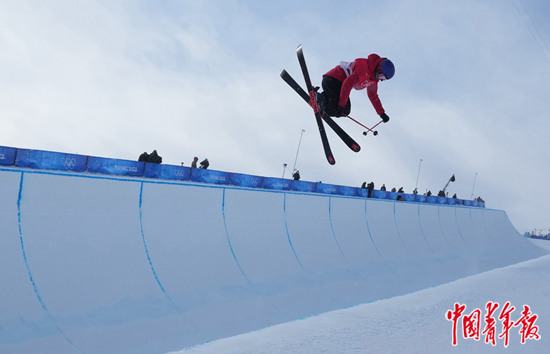
Eileen Gu competes in Women's Freeski Halfpipe Final on Feb 18, Genting Snow Park, Zhangjiakou. (Photo by Li Zhengni, China Youth Daily & China Youth Net)
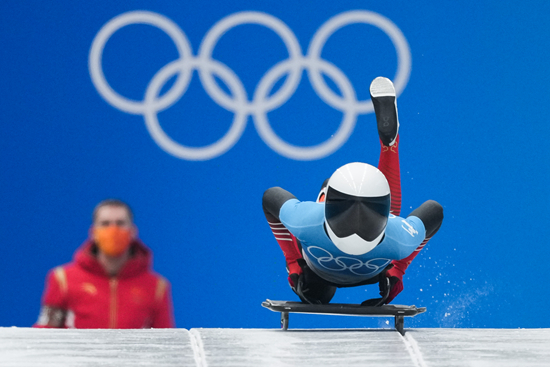
Chinese Athlete Zhao Dan competes in Women's Skeleton at the Beijing Winter Olympics on Feb.12. (Photo Courtesy of VCG)
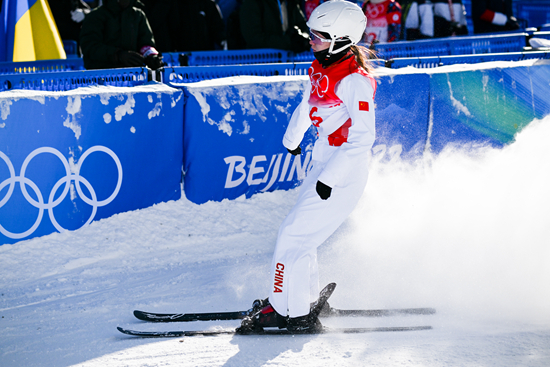
Chinese Athlete Shao Qi competes in Women’s Freestyle Skiing Aerial Qualification at the Beijing Winter Olympics on Feb. 14. (Photo Courtesy of VCG)
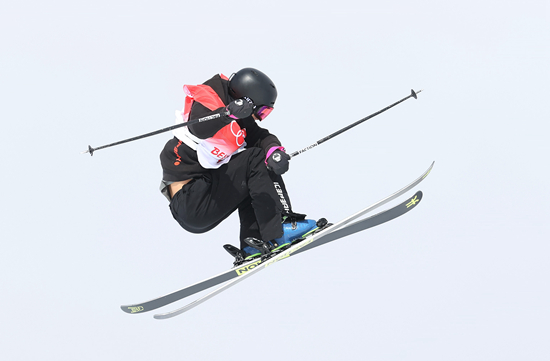
Chinese Athlete He Jinbo competes in Men's Freeski Slopestyle Qualification at the Beijing Winter Olympics on Feb.15. (Photo Courtesy of VCG)
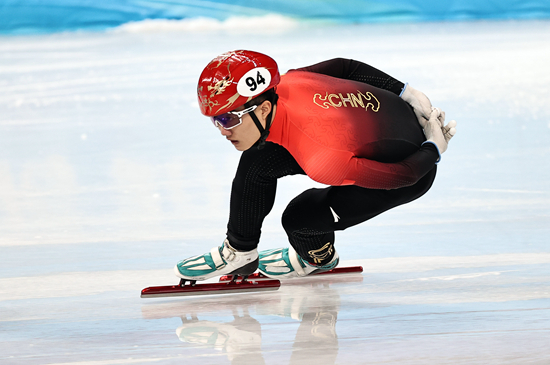
Chinese Athlete Li Wenlong competes in Men's 1000m Preliminary of Short Track
Speed Skating at the Beijing Winter Olympics on Feb.5. (Photo Courtesy of VCG)
Chongli, Feb.19: Eileen Gu pulled off a landslide victory in Women's Freeski Halfpipe Final today, raising her medal count to one silver and two golds.
As she ascended the Olympic podium for the third time, the Panda hat she wore immediately attracted attention. “I want everyone to be amused and delighted by this hat, so as to understand that skiing is a joyous sport. I work hard but do not feel the hardship. I preserve because of my love for it.” answed Gu.
While Eileen Gu becomes teenage sensation and image representative meaning during the Games, another young athletes, Su Yiming, has grown from a well-known rookie snowboarder to the first gold medal winner and also the first male medalist in China’s Olympian history of snowboarding. Knowing that Su is going to celebrate his 18th birthday today, Gu joked, ‘He is the same age as me now. He cannot be considered a child anymore; he is an adult.”
Gu and Su are no doubt the two most influential Chinese athletes born after 00s in Beijing 2022 Winter Olympics, already making Olympian history. And along with them, many other athletes of same age are also competing in different events of the Olympics. Winning or not, they are all contributing to the future of China's winter sports.
“For young people watching the games in front of screen, the achievement made by their peers may be more motivating than the breakthrough of a senior player.” said Eileen Gu after thinking about her influence, “Seeing, maybe they will think, ‘if she can do it, so can I ’.”
Making History by Making Big Decision in Career
“She went all-out and took the Olympics as an opportunity to display and improve herself.” said Zhao Dan, Chinese team’s flag bearer in the opening ceremony and a skeleton rider. Eileen Gu shows her warm-heartedness when enthusiastically greeting volunteers among the delegation, and also turns to be a self-willed competitor in the games.
In Women's Freeski Big Air Final, Gu claimed gold by throwing in a left-side double cork 1620, a highly difficult trick she had never done in formal competiton. Zhao Dan was very touched by this brave decision, and said “We are competing, not for the sake of competition, but to challenge ourselves and to enjoy.”
“When you slide at great speed, you’ll feel the wind hitting against your shoulders, but for most of the time, your body slides like a fish.” On the skeleton track in “Flying Snow Dragon” or the National Sliding Center that is considered as a huge challenge for most skeleton riders, 19-year-oldZhao experienced her moment of enjoyment. “The ice surface is so silky that I did not steer at several turns and let the skeleton go by itself.” said Zhao, a girl from Inner Mongolia finally ranked 9th in Women's Skeleton with a score of 4’09’’52’’’, setting the Olympic record in Chinese history.
The maximum speed of a skeleton can reach 135 km per hour. The astonishing velocity and the head-down posture of athletes make it an extremely dangerous sport that was withdrawn from the Winter Olympics for some time. China started late in this event, formed its national skeleton team in 2015 and made its debut in the 2018 Winter Olympics. A lot of skeleton athletes have been selected from talents in the track and field events in summer sports, and Zhao Dan is one of them.
Before competing in skeleton, Zhao was a triple jumper. In 2018, after winning two championships in the regional games of Inner Mongolia, Zhao’s explosiveness and speed impressed the coaches who were searching for athletes for the national skeleton team. After several round of talks, 17-year old Zhao finally joined the national skeleton team and became the youngest team member. A year later, she began to make her rise in international competitions.
From jumping to sliding, everything has changed including time, space and perspective. Zhao remembered that sometimes when she was doing simulations on the ground, she could see ants passing by. And when people watch from outside, time goes differently outside from athletes sliding through the track inside. For the spectators, the skeleton passes in a blink in the eyes, but for the riders, they feel they still have time to make adjustments at each curve.
Zhao was attracted and thrilled by the speed and time-space changes brought by this sport. Although there is injury and pain, and she had to put on more weight, Zhao was not regretful. She soon stood out in the domestic preliminary, and earned the chance to race in the 2022 Olympics. The appearance of Zhao and her teammate Li Yuxi marked China’s first anticipation in Women’s Skeleton in the Winter Olympics history.
The year 2018 also witnessed a major shift in He Jinbo’s sporting career, from indoor to outdoor, from arena to mountains. Once a martial artist, He Jinbo also turned to winter sports during the national team’s cross-event selection of athletes. Born on January 17, 2005, he is not only the youngest athlete of the Chinese delegation, but also the first Chinese to participate in Men’s Freeski Slopestyle and Freeski Big Air competitions in the 2022 Winter Olympics.
On August 1, 2018, he skied for the first time. “I don’t even know how to put on snowshoes. On the first day, all I learn is wearing shoes and falling, to fall safely.” He Jinbo told reporter. He recalled that in later practice of skills and movements, martial art training provided him physical fitness, and some feeling in the air, "But the skiing part starts from scratch, and martial arts can't help."
Yet the hardest part is not to master new tricks, but to “depend on God” and “get along with nature”. He said that in outdoor venues, the most difficult thing is to control speed in the wind. “If you are not very good at speed control, when it gets windy or cold, and the snow gets bad, it is more difficult for you to find the speed to jump. You will probably fail with the trick, and also get injured easily.”
After practicing for countless times indoor and on snow-covered slopes outside, He Jinbo has fallen in love with the feeling of achievement in making “amazing stunts”, and the free and creative way of skiing culture.
Hard work pays off quickly. In Men’s Freeski Big Air Qualification of the Beijing Winter Olympics on February 7, he performed a double cork 1800 in the third jump, which is the most difficult trick he has ever done. And it is also the second time he has completed this trick at international events. Although he ranked 27th in the qualification, he is satisfied with his performance, “This time, I’ve done the trick with the best quality. I am here to learn and my career has just begun.”
Youngsters in China’s Winter Forte
In China’s Winter Olympic history, the first gold medals in snow events and ice events respectively were won by the national team of Freestyle Skiing Aerials and Short-track Speed Skating. These two teams are teams of aces where prodigies gather, among whom Shao Qi and Li Wenlong are the fresh blood that represent the future of these sports.
Sixteen years after the winning of their first Olympic gold medal, the Chinese national team of Freeski Aerials formed a team of four men and three women in Beijing 2022. Among them, Shao Qi, born in July 2001, is the youngest. There are also veterans like Xu Mengtao, who had competed in four Winter Olympics, and Kong Fanyu, the bronze medalist of the Pyeongchang Winter Olympics.
Although she picked up Freeski Aerials at the age of 10, Shao still thinks of herself as a “timid and unconfident” girl. At the age of 17 or 18, she once fell into confusion, “my predecessors are all extraordinary, and I can barely keep up with them”. She often repeated a remark like “this is terrifying” after trying a new trick, sometimes to the coach and sometimes to herself. She was aware that this might be a way to relieve the stress, because she never had any negative thoughts when she performed in matches.
“I’ve never seen such heavy snow,” said Shao, recalling the snow that made Women’s Freeski Aerials schedule undecided. “Normally we make 4 jumps in training before the competition. We had done 3 jumps that day, and then received notice that the qualification would be postponed for one day.”
But what impressed this young athlete more than the heavy snow is that almost all the team members stuck to the regular difficulty of training against such terrible weather. “No one flinched. I can feel the power of dream in them.”
In the qualification the next day, Shao started in the 10th place among the 24 players. After the first round, Xu was qualified for the final. Shao Qi went into the second round of challenges together with Kong Fanyu, because the degree difficulty was not high and the score was insufficient.
In order to qualify the final, Shao chose to go with back double full jump with a difficulty degree of 3.710, “this is the most difficult trick I can perform at present.” She knows very well that if she does not do it, she would not be competitive to make it to the final.
But in this jump, she made mistakes, landing on hips and falling heavily onto the snow on her back. She hunched for more than ten seconds in the end zone, and then stood up. Her score was lower than that in the first round, putting an end to her Winter Olympics debut. But this imperfect jump made her feel “worth it” at the moment of landing. “I have challenged my limits. As long as I make the jump, I have no regrets.”
But the most memorable thing for Shao is not the moment when she jumped in the air, but that when her predecessors Xu Mengtao and Qi Guangpu realized their dreams. “Almost everything we did on every day in our past four years was meant the Winter Olympics, and when the Games end, it feels like a dream.” Fortunately, for the Chinese National Team of Freeski Aerials there were many sweet dreams in the Winter Olympics.
“I feel more nervous than jumping myself”. Shao said she had been carefully observing the wind direction when watching the matches of her teammates, “Is it tailwind or headwind or will it affect their performance?” But when Xu and Qi landed steadily, all Shao’s worries disappeared, and she excitedly hugged and celebrated with the strangers around her. “It doesn't matter. I’ll still work hard to shine like a little star.” Shao wrote on her social media after the game.
In this Winter Olympics, Li Wenlong, who celebrated his 21st birthday on the opening day of the Games, has been shining brightly.
On Feb. 5, Li Wenlong, embarked on his maiden voyage as an Olympic 1000m short-track speed skater. “It was my first time to participate in the Winter Olympics. Not exactly knowing how things go, I was very nervous during the qualification.”
But Li has a “Big Shot”. Even though his ice skate has broken twice in the events he could still handle the unexpected situation at the critical moment.
On the evening of Feb. 7, Li Wenlong, Wu Dajing and Ren Ziwei, who had defeated many rivals along the way, entered Men’s Short Track 1000m Final. Their opponents were Liu Shaolin and Liu Shaoang from Hungary, and Li’s job was to lead their opponents and create opportunity for his teammates to win.
After the starting gun went off, Li had been leading in front of Liu Shaolin and preventing him from reaching Liu Shaoang. But when there were four laps left to go, he broke his skate in trying to lead his position. Due to damage to the ice surface, the game had to be resumed later. In the rematch, Li continued to lead his opponents, and after helping his teammates successfully win the gold, he also won a silver medal.
After the game, he recalled: “I don’t think about getting a medal then, what I am thinking is helping Chinese team win the championship.”
Li Wenlong’s defending team glory was recognized by speed skating Olympics Champion Wang Meng, who now sat in the commentary. “Look what Li Wenlong did. In order for Ren Ziwei to get into the finals, he supported Ren from the very beginning, and was very effective. The boy deserves everyone’s attention. Don’t forget Li, the young fellow loved by everyone.”
A Journey Just Started
After claiming his first silver medal, Li Wenlong’s popularity has rapidly increased, but he is looking forward to a greater improvement in the sport. “My mentality is better than before, and the route and tactics have also been greatly improved. I have gained experience in the competition, but there is still room for me to optimize my tactics and on-the-spot adaptability.
“After I go off the podium, I will start everything from scratch,” Li said that the end of the Beijing Winter Olympics means a new Olympics cycle has begun. In the next four years, he looks forward to growing from a young skater to the team’s backbone. “I hope I can train hard as ever and have a good mentality.”
Mentality is also valued by He Jinbo. He remembered that when he strived to qualify for the Winter Olympics, his desires caused his movements to deform, and he was always unable to be in a good state for training and competition. “Every time I fail in the first jump in the competitions, then I have to bear greater pressure to compete in the second jump. If I fail again, I will not enter the finals.”
With the help of the team coach, he began to learn to get along with failures. “If I fall to the ground in the first jump, I should try to land steadily in the second jump. Gradually even if I fall in an important competition, I can deal with it relatively relaxed.”
To He Jinbo, Freestyle Skiing is a sport with a long lifespan, not just fit for young athletes. He learned the importance of well-completed tricks and creativity from some veterans at the Winter Olympics, “Freestyle Skiing is more than ‘amazing stunts’. I need to work on the quality of my tricks first, master all the basic movements, and try some more difficult tricks. Maybe in the future, foreign athletes will appreciate our style as well.”
Re-examining the gap between herself and foreign players is also a lesson Zhao Dan has harvested at this Winter Olympics. "I used to think that it would be very difficult to catch up with the foreign athletes, because they had started earlier and practiced for a longer time. But this time I feel that the distance between us is not too far."
She said that in the past, she saw foreign skiers as clouds in the sky, but after competing in the same field this time, she was confident that she would be someone who touches the clouds. “In the Beijing Winter Olympics, young athletes born after 00s have also become a core force. I hope we can represent the future of the sport, and our journey has just started,” said Zhao.
Translator: Yu Jiaming
Proofreader: Meng Lanjuan, Zhao Shuo, Liu Ying
Editor: Zheng Shuyu
Advisor: Zhang Xu












